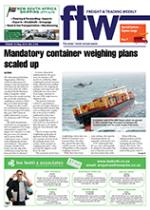Security of goods in transit
and customs delays are the
key challenges facing the
express air and road-freight
industry in Africa, according
to Lesley Haw, managing
director of Sanguine Logistics
International.
“The burning issue is
always the customs clearance
which can cause substantial
delays. While everybody is
trained in the procedures and
processes, what we have found
invaluable is local knowledge
and experience gained from
previous shipments through
the particular control point,”
Haw said.
“If you look at road
freighting to Zambia, there
are additional regulations
as you will have to go
through another country
in transit. Understanding
the regulations of
transit countries and
their restrictions will
influence routing decisions
or documentation
requirements,” she added.
Once the proposed One
Stop Border Post initiatives
are realised she expects to
see a “dramatic difference”
in customs service and
turnaround time due to
standardisation.
In South Africa, National
Treasury has received a
grant from the African
Development Bank to develop
a national policy on One Stop
Border Posts for the country.
The policy project is part of
the government’s regional
integration efforts to ensure
a consistent approach to road
and rail border management.
“Generally our express
airfreight is related to spare
parts for breakdowns. High
value goods but low volumes
are served best by airfreight
express. In many cases,
traditional courier
services serve this
requirement best,
however one has to be
aware of the courier
service size and weight
constraints,” Haw said.
She said Sanguine
offered a range of
two- to eight-tonne
dedicated vehicles for
clients exporting goods
into Africa.
“When dealing with border
crossings and customs up
into Africa you always run
the risk of unexpected delays.
This is over and above delays
experienced due to road
conditions and weather,” Haw
said.
She added that security
would always be a factor for
goods shipments, although
Sanguine had not experienced
any cargo losses.
“We always consider
the risks and plan for the
eventuality. Security is an
activity that should be done
in planning as part of risk
management. We are kept
updated by our transporters
on incidents and threats,”
Haw said.
“At present the most
common is sabotage of
vehicles. It seems to be more
malicious damage to the
vehicles in an attempt to
get money, than the theft of
cargo.”
“However, adequate
insurance, and preventative
security, should always be
taken based on the risk of the
cargo.
INSERT & CAPTION
We always consider
the risks and plan for
the eventuality.
– Lesley Haw

